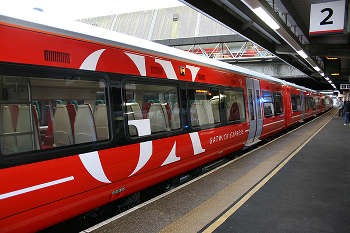Industrial rail disputes have caused widespread disruption in southern England and Scotland, with unions taking different approaches to the ongoing row over removing train guards in favour of driver only operation (DOO).
Drivers’ union ASLEF has backed down in its dispute with Govia Thameslink Railway (GTR) over the extension of DOO on its Gatwick Express services.

A new 12-car Gatwick Express train
ASLEF put a consent order on its website, accepting that the drivers would not take any further industrial action over 12-car DOO trains. The union declined to comment any further.
However an official from the Rail, Maritime and Transport Union (RMT), which is also in dispute with the company over the issue on Southern services, told Transport Network that the union was willing to listen but had no room to manoeuvre on further compromise.
South East Regional Organiser Paul Cox said GTR had rejected a compromise put forward by the union in which ticket inspectors would be trained to do the job of guards and vice versa.
He added: ‘I don't know what will happen next. If they come up with something I am always willing to listen but we cannot move any further.’
Mr Cox said it was 'time to take the franchise off GTR', adding that there was 'some merit' to London mayor Sadiq Khan's idea of handing control of the franchise to Transport for London. He also revealed that Mr Khan had spoken to him about this during his election campaign.
He added: 'I don’t think the management will ever get on top of the crisis in the company.’
Mr Cox went on to criticise the Department for Transport (DfT) for its apparent support of GTR. 'I think it’s the DfT's agenda to get rid of these guards,' he said.
Absenteeism allegations
The dispute has turned acrimonious, not least because of accusations of a 'sick note strike', with Southern bosses publishing figures that showed an 'unusually high level of staff sickness' among conductors, which they claimed has led to cancellations.
This has led to suggestions that union members were purposely disrupting the service through absenteeism. The RMT has strenuously denied this claim and argued there was no "unofficial action" on Southern but simply mismanagement, adding that all sick leave has to be signed off with a doctor's note from day one.
Mr Cox revealed to Transport Network an email sent from bosses to Southern conductors, which showed that it accepted staffing issues had led to high rates of absence.
In the email, which referred to the company’s decision to withdraw conductors’ right to swap shifts, a Southern manager said: 'There are a large number of you that have raised concerns with this as it's impacted on your work and home lives and in the worst cases caused absence from work through stress and anxiety.’
Following this email Southern changed tack and again allowed workers to swap shifts.
A Southern spokesman said: ‘This decision was taken after we listened to what our staff said and in the interests of passengers. We hope that re-instating mutual shift exchanges will be beneficial all round.’
New Scotrail strike
In Scotland on Thursday (23 June), RMT members held the second of six planned strikes in a dispute with Scotrail over the removal of guards.
Scotrail said it ran 70% of its normal service during the first strike on Tuesday and predicted that ‘this number will grow’ if the strike continues.
Register now for full access
Register just once to get unrestricted, real-time coverage of the issues and challenges facing UK transport and highways engineers.
Full website content includes the latest news, exclusive commentary from leading industry figures and detailed topical analysis of the highways, transportation, environment and place-shaping sectors.
Use the link below to register your details for full, free access.
Already a registered? Login